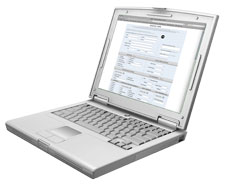
| Number 367 | July 2010 |
A Delicate Balance:
"Minimum Fuel" vs. "Emergency Fuel"
Declarations
 In a number of recent ASRS reports, Part 121 pilots bemoan the fact that they declared “minimum fuel” and were disappointed (irate in some cases) that they weren’t afforded priority handling by ATC. It’s evident that some pilots in today’s cost-conscious airline industry are unaware of the need to declare a fuel emergency if they need to have their arrival expedited. The emergency declaration is a tool they need to have in their flight bags when appropriate.
In a number of recent ASRS reports, Part 121 pilots bemoan the fact that they declared “minimum fuel” and were disappointed (irate in some cases) that they weren’t afforded priority handling by ATC. It’s evident that some pilots in today’s cost-conscious airline industry are unaware of the need to declare a fuel emergency if they need to have their arrival expedited. The emergency declaration is a tool they need to have in their flight bags when appropriate.
This month we provide a quick review of “fuel emergency” and “minimum fuel” declarations, as well as incident reports illustrating situations in which pilots declared “minimum fuel” only to discover that subsequent events deteriorated into near, or actual, fuel emergencies.
Background and Definitions
A “fuel emergency” declaration is not defined in the Aeronautical Information Manual (AIM) or Federal Aviation Regulations, but is widely understood in the industry to mean a condition in which in the judgment of the pilot-in-command, it is necessary to proceed directly to the airport of intended landing due to low fuel. Use of this term conveys an explicit understanding that priority handling by ATC is both required and expected [Reference: FAA InFO 08004].
In contrast, the AIM (section 5-5-15) and Pilot/Controller Glossary provide the following definition of a “minimum fuel” declaration:
“Indicates an aircraft’s fuel supply has reached a state where, upon reaching the destination, it can accept little or no delay. This is not an emergency situation [ASRS emphasis] but merely indicates an emergency situation is possible should any undue delay occur.”
The ATC Handbook (ATP 7110.65P: 2−1−8) adds the following guidance for controllers:
“A minimum fuel advisory does not imply a need for traffic priority. Common sense and good judgment will determine the extent of assistance to be given in minimum fuel situations. If, at any time, the remaining usable fuel supply suggests the need for traffic priority to ensure a safe landing, the pilot should declare an emergency and report fuel remaining in minutes.”
Pilot Expectation vs. ATC Reality
Pilots often expect that the declaration of “minimum fuel” should mean ATC assistance by way of direct routing, minimal or no holding, and no off-course vectors, but this expectation is not always operationally feasible. In the following incident, an air carrier pilot was critical of ATC’s “lack of a plan,” when the real problem was the flight crew’s failure to understand that a “minimum fuel” declaration did not convey handling priority to ATC:
![]() Forecast showed chance of thunderstorms in vicinity. Captain and crew decided to increase fuel at takeoff to 24K…Severe thunderstorms and windshear, we got holding and vectors all over the place. We told ATC we cannot take delay. They had no plan! After again stating we cannot take delay, Captain declared minimum fuel…We are east of the airport and are asked to go direct to another VOR. We advised ATC we cannot go to that VOR and then to the airport. ATC asks if we are declaring an emergency. We say if you are insisting on sending us to that VOR we will! We finally get a vector to the south and break out in the clear. We landed with 13.5K…Next time we will declare an emergency….
Forecast showed chance of thunderstorms in vicinity. Captain and crew decided to increase fuel at takeoff to 24K…Severe thunderstorms and windshear, we got holding and vectors all over the place. We told ATC we cannot take delay. They had no plan! After again stating we cannot take delay, Captain declared minimum fuel…We are east of the airport and are asked to go direct to another VOR. We advised ATC we cannot go to that VOR and then to the airport. ATC asks if we are declaring an emergency. We say if you are insisting on sending us to that VOR we will! We finally get a vector to the south and break out in the clear. We landed with 13.5K…Next time we will declare an emergency….
A B737-300 flight crew found themselves short of fuel when their destination implemented holding. In this instance, ATC clearly outlined their options:

![]() While en route, we were told to slow as much as practical because of holding over XYZ. As we approached XYZ, Center was issuing EFC times of 1 hour. We were on top of the stack with quite a few aircraft below us. Looking at our computer we determined that we could not hold for 1 hour or more. I notified Center and said we have minimum fuel and could not hold for a length of time. The firm reply from Center was, ‘Hold or divert to ZZZ or declare an emergency.’ We went back to the computer and checked the numbers again. We also notified Dispatch what was going on and the decision that I was about to make. We did not have enough fuel for ZZZ to land safely. My First Officer and I both agreed that declaring an emergency was the best choice. I notified Center, declared an emergency, and landed at the airport with no incident.
While en route, we were told to slow as much as practical because of holding over XYZ. As we approached XYZ, Center was issuing EFC times of 1 hour. We were on top of the stack with quite a few aircraft below us. Looking at our computer we determined that we could not hold for 1 hour or more. I notified Center and said we have minimum fuel and could not hold for a length of time. The firm reply from Center was, ‘Hold or divert to ZZZ or declare an emergency.’ We went back to the computer and checked the numbers again. We also notified Dispatch what was going on and the decision that I was about to make. We did not have enough fuel for ZZZ to land safely. My First Officer and I both agreed that declaring an emergency was the best choice. I notified Center, declared an emergency, and landed at the airport with no incident.
ATC-Declared Fuel Emergencies
In more than a few situations, vigilant controllers have elevated to emergency status what the flight crew intended only as a fuel advisory. This is an ATC prerogative under the provisions of Order 7110.65P (2-1-8). This report from an air carrier light transport flight crew illustrates:
![]() …We left with just 2,250 pounds of fuel onboard. Minimum fuel was 2,186 pounds. The burn to destination was 728 pounds; hold fuel of 358 (25 minutes), reserve of 800- pounds, and alternate of 300. We were instructed after diverting around weather to head directly to the ABCDE intersection when able. When we were able to head direct, we advised ATC, who then gave us a change in routing…We had done considerable diverting, so I did some fuel calculations and determined with our current fuel load, we would arrive with 1,200-1,300 pounds of fuel.
…We left with just 2,250 pounds of fuel onboard. Minimum fuel was 2,186 pounds. The burn to destination was 728 pounds; hold fuel of 358 (25 minutes), reserve of 800- pounds, and alternate of 300. We were instructed after diverting around weather to head directly to the ABCDE intersection when able. When we were able to head direct, we advised ATC, who then gave us a change in routing…We had done considerable diverting, so I did some fuel calculations and determined with our current fuel load, we would arrive with 1,200-1,300 pounds of fuel.
The ATIS was reporting 12,000 foot overcast and 9 SM visibility at destination…The forecast was calling for BKN 5,000 and BKN 10,000 feet with more than 6 SM visibility. Based on the good weather both at destination and at our alternate, I did not feel it was necessary to declare minimum fuel, since we would be landing with 100 pounds more than our minimum fuel of 1,100 pounds. Five minutes from [initial approach fix], Center asked if we could hold. I advised them that the weather was fine, but that our fuel situation could become an issue. He then checked with Approach and then queried us about our alternate. Upon reaching [approach fix], we were told to contact Approach and that ATC was declaring a fuel emergency for us. I advised him that if we had to hold, we would be in a minimum fuel situation, not an emergency situation. We contacted Approach; ATC did not query us as to our fuel. We continued to destination under normal flight operations and landed without incident…Upon parking at the gate, we had just less than 1,200 pounds of fuel on board the aircraft….
Fuel Reserves and Minimum Fuel Situations
In recent years U.S airlines have taken many diverse, successful measures to reduce fuel expenses. One of these involves working with the FAA to change en-route fuel reserve requirements to reflect state-of-the-art navigation, communication, surveillance, and wind forecast systems. For a light transport jet flight crew, their company’s new fuel reserve program allowed few options at the destination:
![]() Minimum fuel landing with 1,580 pounds on the gauges at gate arrival. Since the fuel gauges go amber at 900 pounds, we had amber gauges on both sides which was decidedly uncomfortable. Note that a second approach requires 600 pounds to 800 pounds of fuel depending on the length of the downwind. If we had needed to go around for any reason, we would have had a low fuel emergency.
Minimum fuel landing with 1,580 pounds on the gauges at gate arrival. Since the fuel gauges go amber at 900 pounds, we had amber gauges on both sides which was decidedly uncomfortable. Note that a second approach requires 600 pounds to 800 pounds of fuel depending on the length of the downwind. If we had needed to go around for any reason, we would have had a low fuel emergency.
Per 14 CFR 121.647 (c) and (d), we should consider ‘one instrument approach and possible missed approach at destination.’ In other words, we should assume we might have to go around and carry enough fuel to do it without an emergency…One might argue that to accept a fuel load which allows no options at the destination could be considered reckless operation…In the past, we carried a fat reserve [contingency fuel] which allowed and made up for poor planning with regard to holding, terminal delays, and second approaches. Now we have set a leaner reserve, but we have not improved consideration of other factors such as go-around or diversion after a missed approach at the destination….
|
| ASRS Alerts Issued in May 2010 | |
|---|---|
| Subject
of Alert |
No. of Alerts |
| Aircraft or aircraft equipment |
12 |
| Airport facility or procedure |
10 |
| ATC equipment or procedures |
12 |
| Company policies |
3 |
| TOTAL |
37 |
| May
2010 Report Intake |
|
|---|---|
| Air Carrier/Air Taxi Pilots | 2,706 |
| General Aviation Pilots | 805 |
| Controllers | 623 |
| Cabin/Mechanics/Military/Other | 460 |
| TOTAL | 4,594 |
P.O. Box 189 | Moffett Field, CA | 94035-0189
 What’s New at ASRS?
What’s New at ASRS?